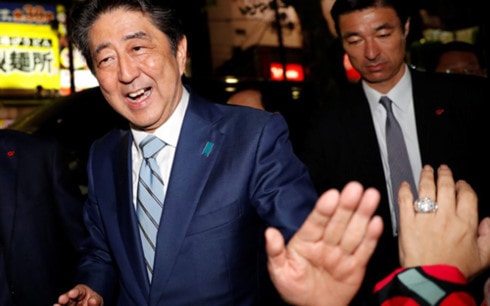Japan's House of Representatives has election results
According to initial results, the coalition between the Liberal Democratic Party and the Komeito Party won an overwhelming victory in the 48th Japanese House of Representatives election.
As of 11:00 a.m. on October 23 (Japan time), there were still 4 constituencies with undetermined results, but according to initial results, the ruling coalition between the Liberal Democratic Party (LDP) and the Komeito Party won an overwhelming victory in the 48th Japanese House of Representatives election.
 |
| Mr. Abe can celebrate even though the final results have not been announced. (Illustration photo: Reuters) |
The ruling coalition has now won 312 of the 465 seats, accounting for more than two-thirds of the seats in the House of Representatives. Of these, Prime Minister Shinzo Abe's LDP alone won 283 seats. The Komeito Party, the LDP's partner in the ruling coalition, won 29 seats.
The Constitutional Democratic Party became the largest opposition party in the House of Representatives with 54 seats. Next, the Party of Hope led by Tokyo Governor Yuriko Koike won only 49 seats. The Communist Party won only 12 seats compared to 21 seats before the election. Non-partisan lawmakers won 23 seats.
The victory will give the LDP and Prime Minister Abe a head start in pushing for constitutional revision. Speaking on television after securing victory, Prime Minister Abe said he wanted to gain support from lawmakers from other parties in his bid to revise the constitution. He also pledged to raise the consumption tax from 8 to 10 percent from October 2019 to boost social welfare and allow nuclear power plants that meet safety standards to resume operations.
Due to the impact of storms and heavy rain, the voter turnout rate was only nearly 54%. This is the second lowest voter turnout rate in history since World War II. Although, the number of early voters had reached more than 21 million people, an increase of 62.5% compared to the previous House of Representatives election. Heavy rain and thunderstorms also made it difficult to transport and count ballots in some areas.
Japanese business circles have reacted positively to the election results. Sadayuki Sakakibara, chairman of the Japan Business Federation (Keidanren), welcomed the election results, saying they would help the government's policies be implemented smoothly. He also stressed that the regional security environment is becoming increasingly tense and Prime Minister Abe needs to demonstrate leadership on all domestic and international issues.
The US government has not yet officially congratulated Prime Minister Abe. However, US scholars believe that the victory of the ruling coalition will positively contribute to the development of bilateral relations, especially right before the visit of US President Donald Trump to Japan.
Mr. Andrew Oros, director of international studies at Washington College – Maryland, assessed that Mr. Abe's victory was good for the US. Mr. Donald Trump will visit Japan, discuss with Prime Minister Abe, the best friend in the world at the present time, and has just become a strong partner in Asia after this victory.
However, some analysts also expressed concern that Prime Minister Abe's tough stance, especially his efforts to amend Article 9 of the Constitution, will affect Japan's relations with its two neighboring countries, China and South Korea./.
According to VOV
| RELATED NEWS |
|---|
